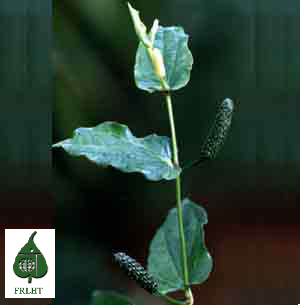
Piper longum L.
PIPERACEAE
Vernacular
names:
Hindi
-
Pipli
Kannada
-
fiippali
Malayalam - Thippali
Marathi - Pimpli
Sanskrit - Pippali, Kana
Tamil -
Thippili
Telugu
-
Pippallu
Threat status:
Not
Evaluated
-
KA
Lower Risk
near threatened - KL
Endangered
(A 1 c,d) - TN
Habit:
Sub-scandent herb
Habitat: Moist deciduous to evergreen forests
Altitude: 500 - 1500 m
Distribution:
Global:
Indo-Malaysia. National:
Recorded
in the moist tropical zones of eastern Himalaya and other hilly
regions of several states. Believed to be a native of
northeastern India. Cultivated in several places.
Regional:
Common in
the Western Ghats in Kerala and rare in Tamil Nadu. Not reported
from Karnataka.
Description:
A slender
sub-scandent herb, branchlets erect, straggling or sometimes
climbing, hairless, with swollen nodes and those of creeping
branches with roots at lower nodes. Leaves alternate,
variable in shape, usually
egg-shaped-heart-shaped,
7-15 x 4-6
cm, base heart-shaped and unequal, apex acute to acuminate,
margin entire, hairless, lower leaves with long stalks and upper
ones without stalk; lateral nerves 5-7 arising from the base.
Male spikes erect, 2-7 cm long, greenish yellow,
fleshy, cylindrical, with minute male flowers. Female
spikes erect, 1-3 cm long, yellow. Fruiting spikes
cylindrically oblong, about 4 x 1 cm. Berries globose,
about 2 mm across, partly sunken in the rachis, compactly
arranged, red turning black when ripe.
Phenology: Flowering &
Fruiting:
September
to November; March to June
Medicinal uses:
Roots and
fruiting spikes are used in treating diarrhoea, indigestion,
jaundice, urticaria, abdominal disorders, hoarseness of voice,
asthma, hiccough, cough, piles, malarial fever, flatulence,
vomiting, thirst, oedema, earache, wheezing, chest conjestion,
throat infections, worms and sinusitis. This is one of the
ingredients in the Siddha medicine 'trikadugu'. Also
considered a rejuvenating plant.
Trade
information:
Local,
regional and global. Roots and rhizomes are sold under the trade
name Pipp/amoo/. Stem pieces are also found as an
adulterant. Mature but unripe fruiting spikes are also used as a
drug and traded under the name Bara pips/, Chota pipa/ or
Long pepper. Priced at Rs.150 to 180/Kg. (Market studies,
1999-2000).
Mode of
propagation:
By seeds,
stem cuttings and tillers
Special
characters:
The habit
of this species is unique. The only Piper species which
does not show typical climbing habit. Erect fruiting spikes are
another important character for easy identification.

